
Returning once more to the Story of the Súfí and the Cadi. بار دیگر رجوع کردن به قصهی صوفی و قاضی
گفت صوفی در قصاص یک قفا سر نشاید باد دادن از عمی
The Súfí said (to himself), “It does not behove me blindly to lose my head by taking retaliation for a single slap on the nape.
خرقهی تسلیم اندر گردنم بر من آسان کرد سیلی خوردنم
My putting on the (Súfí’s) mantle of resignation has made it easy for me to suffer blows.”
دید صوفی خصم خود را سخت زار گفت اگر مشتش زنم من خصموار
The Súfí observed that his adversary was exceedingly frail: he said (to himself), “If I give him a hostile blow with my fist,
او به یک مشتم بریزد چون رصاص شاه فرماید مرا زجر و قصاص
At my first blow he will crumble like dead, and then the king will punish me and exact retaliation.
خیمه ویرانست و بشکسته وتد او بهانه میجود تا در فتد
The tent is ruined and the tent-pin broken: it (the tent) is seeking (the least) excuse to fall in.
بهر این مرده دریغ آید دریغ که قصاصم افتد اندر زیر تیغ
It would be a pity, a (great) pity, that on account of this (virtually) dead man retaliation should fall upon me under the sword.”
چون نمیتوانست کف بر خصم زد عزمش آن شد کش سوی قاضی برد
Since he durst not give his adversary a fisticuff, he resolved to take him to the Cadi.
که ترازوی حق است و کیلهاش مخلص است از مکر دیو و حیلهاش
Saying (to himself), “He (the cadi) is God’s scales and measure, he is the means of deliverance from the deceit and cunning of the Devil.
هست او مقراض احقاد و جدال قاطع جن دو خصم و قیل و قال
He is the scissors for (cutting off) enmities and wranglings, he is the decider of the quarrels and disputes of the two litigants.
دیو در شیشه کند افسون او فتنهها ساکن کند قانون او
His spells put the Devil in the bottle, his legal ruling makes dissensions cease.
چون ترازو دید خصم پر طمع سرکشی بگذارد و گردد تبع
When the covetous adversary sees the scales (of justice), he abandons rebelliousness and becomes submissive;
ور ترازو نیست گر افزون دهیش از قسم راضی نگردد آگهیش
But if there are no scales, (even) though you give him more (than his fair share) his shrewdness will never be satisfied with the portion (allotted to him).”
هست قاضی رحمت و دفع ستیز قطرهای از بحر عدل رستخیز
The cadi is a mercy (bestowed to God) and the means of removing strife: he is a drop from the ocean of the justice of the Resurrection.
قطره گرچه خرد و کوتهپا بود لطف آب بحر ازو پیدا بود
Though the drop be small and short of foot, (yet) by it the purity of the ocean’s water is made manifest.
از غبار ار پاک داری کله را تو ز یک قطره ببینی دجله را
If you keep the (outer) veil (coat of the inward eye) free from dust, you will see the Tigris in a single drop (of water).
جزوها بر حال کلها شاهدست تا شفق غماز خورشید آمدست
The parts bear witness to the state of (their) wholes, so that the afterglow of sunset has become an informer concerning the sun.
آن قسم بر جسم احمد راند حق آنچ فرمودست کلا والشفق
God applied that oath, (namely), His Words Verily (I swear) by the afterglow of sunset, to the body of Ahmad (Mohammad).
مور بر دانه چرا لرزان بدی گر از آن یک دانه خرمندان بدی
Wherefore should the ant have been trembling (in desire) for the grain (of corn), if from that single grain it had known (inferred) the (existence of) the stack?/
بر سر حرف آ که صوفی بیدلست در مکافات جفا مستعجلست
Come (now) to the topic (in hand), for the Súfi is distraught (has lost control of his reason) and is making haste to exact redress for the injury (inflicted on him).
ای تو کرده ظلمها چون خوشدلی از تقاضای مکافی غافلی
O thou that has committed deeds of injustice, ho art thou (so) glad at heart? Art thou unaware of the demand (that will be made upon thee) by him who exacts the penalty?
یا فراموشت شدست از کردههات که فرو آویخت غفلت پردههات
Or hast thou forgotten those deeds of thine, since heedlessness has let down curtains (of oblivion) over thee?
گر نه خصمیهاستی اندر قفات جرم گردون رشک بردی بر صفات
If there were no litigations pursuing thee the celestial orb would envy thy happiness,
لیک محبوسی برای آن حقوق اندک اندک عذر میخواه از عقوق
But on account of those just claims (against thee) thou art embarrassed. Little by little, (therefore), beg to be excused for thy unrighteousness.
تا به یکبارت نگیرد محتسب آب خود روشن کن اکنون با محب
Lest the Inspector suddenly arrest thee, now (at once) make thy (turbid) water clear (make full amends and wipe out thy injustice) towards the lover (of God).
رفت صوفی سوی آن سیلیزنش دست زد چون مدعی در دامنش
The Súfi went to the man who had slapped him, and laid hold of his skirt like a plaintiff.
اندر آوردش بر قاضی کشان کین خر ادبار را بر خر نشان
Haling him along, he brought him to the Cadi, saying, “Mount this asinine miscreant on an ass (and parade him through the streets),
یا به زخم دره او را ده جزا آنچنان که رای تو بیند سزا
Or punish him with blows of the whip, according as thy judgement may deem fitting;
کانک از زجر تو میرد در دمار بر تو تاوان نیست آن باشد جبار
For (in the case of) one who dies under thy chastisement, no fine is (imposed) on thee in vengeance (for him): that (death) is unpenalised.”
در حد و تعزیر قاضی هر که مرد نیست بر قاضی ضمان کو نیست خرد
When any one has died under the punishment and flagellation of the cadi no responsibility lies on the cadi, for he (the cadi) is not a person of small account.
نایب حقست و سایهی عدل حق آینهی هر مستحق و مستحق
He is God’s deputy and the shadow of God’s justice, the mirror (that displays the real nature) of every plaintiff and defendant;
کو ادب از بهر مظلومی کند نه برای عرض و خشم و دخل خود
For he inflicts correction for the sake of one who has been wronged, not for the sake of his honour or his anger or his income (profit).
چون برای حق و روز آجلهست گر خطایی شد دیت بر عاقلهست
Since it is (done) for the sake of God and the Day (of Judgement) hereafter, if a mistake is made (by him) the blood-wit falls upon the (dead man’s) kinsmen on the father’s side.
آنک بهر خود زند او ضامنست وآنک بهر حق زند او آمنست
He who strikes (and kills) for his own sake is (held) responsible, while he who strikes (and kills) for God’s sake is secure.
گر پدر زد مر پسر را و بمرد آن پدر را خونبها باید شمرد
If a father strikes his son and he (the son) dies, the father must pay the blood-price,
زانک او را بهر کار خویش زد خدمت او هست واجب بر ولد
Because he struck him for his own benefit, (since) it is the duty of the son to serve him (the father).
چون معلم زد صبی را شد تلف بر معلم نیست چیزی لا تخف
(But) when a teacher strikes a boy and he (the boy) perishes (is killed by the blows), nothing (in the way of penalty) is (imposed) on the teacher; no fear’
کان معلم نایب افتاد و امین هر امین را هست حکمش همچنین
For the teacher is a deputy (of God) and a trustee; and the ease of every trustee is the same as this
نیست واجب خدمت استا برو پس نبود استا به زجرش کارجو
It is not his (the boy’s) duty to serve his master (teacher) therefore in chastising him the master was not seeking benefit (for himself),
ور پدر زد او برای خود زدست لاجرم از خونبها دادن نرست
But if his father struck him, he struck for his own sake:’ consequently he was not freed from (responsibility for) paying the blood-price.
پس خودی را سر ببر ای ذوالفقار بیخودی شو فانیی درویشوار
Behead (your) selfhood, then, O (you who resemble the sword) Dhu ‘l-faqár: become a selfless naughted one like the dervish.
چون شدی بیخود هر آنچ تو کنی ما رمیت اذ رمیتی آمنی
When you have become selfless, everything that you do (is a case of)thou didst not throw when thou threwest, (and) you are safe.
آن ضمان بر حق بود نه بر امین هست تفصیلش به فقه اندر مبین
The responsibility lies on God, not on the trustee: ‘tis set forth plainly in (books of) jurisprudence.
هر دکانی راست سودایی دگر مثنوی دکان فقرست ای پسر
Every shop has a different (kind of) merchandise: the Mathnawi is the shop for (spiritual) poverty, O son.
در دکان کفشگر چرمست خوب قالب کفش است اگر بینی تو چوب
In the shoemaker’s shop there is fine leather: if you see wood (there), it is (only) the mould for the shoe.
پیش بزازان قز و ادکن بود بهر گز باشد اگر آهن بود
The drapers have (in their shops) silk and dun-coloured cloth: if iron be (there), it is (only to serve) for a yard-measure.
مثنوی ما دکان وحدتست غیر واحد هرچه بینی آن بتست
Our Mathnawi is the shop for Unity: anything that you see (there) except the One (God) is (only) an idol
بت ستودن بهر دام عامه را همچنان دان کالغرانیق العلی
Know that to praise an idol for the purpose of ensnaring the vulgar is just like (the Prophet’s reference to) “the most exalted Cranes
خواندش در سورهی والنجم زود لیک آن فتنه بد از سوره نبود
He recited it those words) quickly in the Súra (entitled) Wa’l-Najm, but it was a temptation (of the Devil), it was not (really) part of the Súra.
جمله کفار آن زمان ساجد شدند هم سری بود آنک سر بر در زدند
Thereupon all the infidels prostrated themselves (in worship): ‘twas a mystery (of Divine Wisdom), too, that they knocked their heads upon the door.
بعد ازین حرفیست پیچاپیچ و دور با سلیمان باش و دیوان را مشور
After this there is a perplexing and abstruse argument stay with Solomon and do not stir up the demons!
هین حدیث صوفی و قاضی بیار وان ستمکار ضعیف زار زار
Hark, relate the story of the St and the Cadi and the offender who was (so) feeble and wretchedly ill.
گفت قاضی ثبت العرش ای پسر تا برو نقشی کنم از خیر و شر
The Cadi said (to the Súfi), “Make the roof firm, O son, in order that I may decorate it with good and evil
کو زننده کو محل انتقام این خیالی گشته است اندر سقام
Where is the assailant? Where is that which is subject to vengeance? This man in (consequence of) sickness has become a (mere) phantom.
شرع بهر زندگان و اغنیاست شرع بر اصحاب گورستان کجاست
The law is for the living and self-sufficient: where (how) is the law (binding) upon the occupants of the graveyard?”
آن گروهی کز فقیری بیسرند صد جهت زان مردگان فانیتراند
The class (of men) who are headless (selfless) because of (their spiritual) poverty are in a hundred respects more naughted than those dead (and buried).
مرده از یک روست فانی در گزند صوفیان از صد جهت فانی شدند
The dead man is naughted (only) from one point of view, (namely), as regards loss (of bodily life); the Súfis have been naughted in a hundred respects.
مرگ یک قتلست و این سیصد هزار هر یکی را خونبهایی بیشمار
(Bodily) death is a single killing, while this (spiritual death) is three hundred thousand (killings), for each one of which there is a blood-price beyond reckoning.
گرچه کشت این قوم را حق بارها ریخت بهر خونبها انبارها
Though God hath killed these folk many a time, (yet) He hath poured forth (infinite) stores (of grace) in payment of the blood-price.
همچو جرجیساند هر یک در سرار کشته گشته زنده گشته شصت بار
Every one (of these martyrs) is inwardly like Jirjís (St George): they have been killed and brought to life (again) sixty times.
کشته از ذوق سنان دادگر میبسوزد که بزن زخمی دگر
From his delight in (being smitten by) the spear-point of the (Divine) Judge, the killed one is ever burning (in rapture) and crying. Strike another blow!”
والله از عشق وجود جانپرست کشته بر قتل دوم عاشقترست
(I swear) by God, from love for the existence that fosters the spirit, the killed one longs (still) more passionately to be killed a second time.
گفت قاضی من قضادار حیم حاکم اصحاب گورستان کیم
The Cadi said, “I am the cadi for the living: how am I the judge of the occupants of the graveyard?
این به صورت گر نه در گورست پست گورها در دودمانش آمدست
1f to outward seeming this man is not laid low in the grave, (yet) graves have entered into his household
بس بدیدی مرده اندر گور تو گور را در مرده بین ای کور تو
You have seen many a dead man in the grave: (now), O, blind one, see the grave in a dead man.
گر ز گوری خشت بر تو اوفتاد عاقلان از گور کی خواهند داد
If bricks from a grave have fallen on you, how should reason able persons seek redress from the grave?
گرد خشم و کینهی مرده مگرد هین مکن با نقش گرمابه نبرد
Do not concern yourself with anger and hatred against a dead man: beware, do not wake war on (one who is as dead as) the pictures in a bath-house.
شکر کن که زندهای بر تو نزد کانک زنده رد کند حق کرد رد
Give thanks that a living one did not strike you, for he whom the living one rejects is rejected of God.
خشم احیا خشم حق و زخم اوست که به حق زندهست آن پاکیزهپوست
The anger of the living ones is God’s anger and His blows for that pure-skinned one is living through God.
حق بکشت او را و در پاچهش دمید زود قصابانه پوست از وی کشید
God killed him and breathed on his trotters and quickly, like a butcher, stripped off his skin.
نفخ در وی باقی آمد تا مب نفخ حق نبود چو نفخهی آن قصاب
The breath remains in him till (he reaches) the final bourn: the breathing of God is not as the breathing of the butcher.
فرق بسیارست بین النفختین این همه زینست و آن سر جمله شین
There is a great difference between the two breathings: this is wholly honour, while that (other) side is entirely, shame.
این حیات از وی برید و شد مضر وان حیات از نفخ حق شد مستمر
This (the latter) took life away from it (the slaughtered beast) and injured it, while by the breathing of God that (spiritual) life was made perpetual.
این دم آن دم نیست کاید آن به شرح هین بر آ زین قعر چه بالای صرح
This (Divine) breath is not a breath ‘that can be described hark, come up from the bottom of the pit to the top of the palace.
نیستش بر خر نشاندن مجتهد نقش هیزم را کسی بر خر نهد
Tis not a sound legal decision to mount him (the defendant) on an ass (and parade him): does any one lay upon an ass a (mere) picture of firewood?
بر نشست او نه پشت خر سزد پشت تابوتیش اولیتر سزد
The back of an ass is not his proper seat: the back of a bier is more fitting for him.
ظلم چه بود وضع غیر موضعش هین مکن در غیر موضع ضایعش
What is injustice? To put (a thing) out of its proper place: beware, do not let it be lost (by putting it) out of its place.”
گفت صوفی پس روا داری که او سیلیم زد بیقصاص و بیتسو
The Súfi said, “Then do you think it right for him to slap me without (my taking) retaliation and without (his paying) a farthing?
این روا باشد که خر خرسی قلاش صوفیان را صفع اندازد بلاش
Is it right that a big rascally bear should inflict slaps on Súfis for nothing?”
گفت قاضی تو چه داری بیش و کم گفت دارم در جهان من شش درم
The Cadi said (to the defendant), “What (coins) have you, larger or smaller?” He replied, “I have (only) six dirhems in the world.”
گفت قاضی سه درم تو خرج کن آن سه دیگر را به او ده بیسخن
Said the Cadi, “Spend three dirhems (on yourself) and give the other three to him without (any further) words.
زار و رنجورست و درویش و ضعیف سه درم در بایدش تره و رغیف
(For,” he thought to himself), “he (the defendant) is weak and ill and poor and infirm: he will need three dirhems for vegetables and loaves.”
بر قفای قاضی افتادش نظر از قفای صوفی آن بد خوبتر
His (the defendant’s) eye fall on the nape of the Cadi’s neck: it was better (more inviting) than the nape of the Súfi.
راست میکرد از پی سیلیش دست که قصاص سیلیم ارزان شدست
He raised his hand to slap it, saying (to himself), “The retaliation (penalty) for my slap has been made cheap.”
سوی گوش قاضی آمد بهر راز سیلیی آورد قاضی را فراز
He approached the Cadi’s ear (as though) for the purpose of (whispering) a secret, and dealt the Cadi a (severe) blow with his palm.
گفت هر شش را بگیرید ای دو خصم من شوم آزاد بی خرخاش و وصم
“O my two enemies,” he cried, “take all the six dirhems: (then) I shall be free (from care and) without trouble and anxiety.”
Special Offers
by: Reza about (category: Masnavi, Persian Poetry)



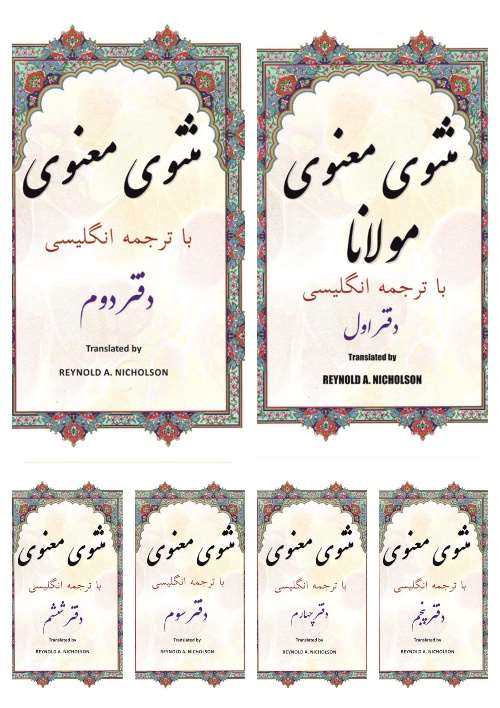
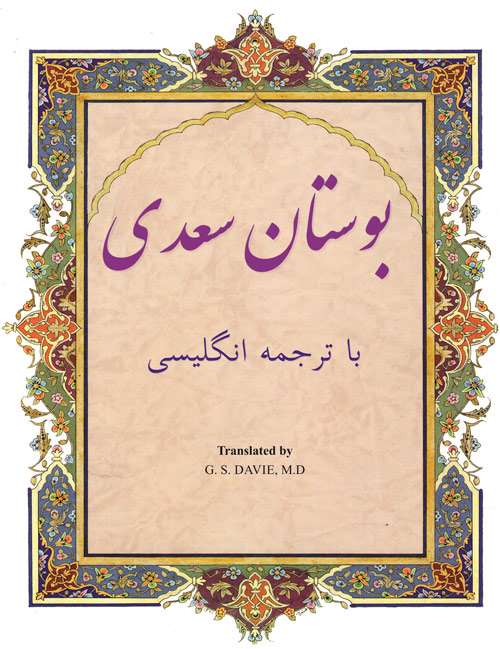
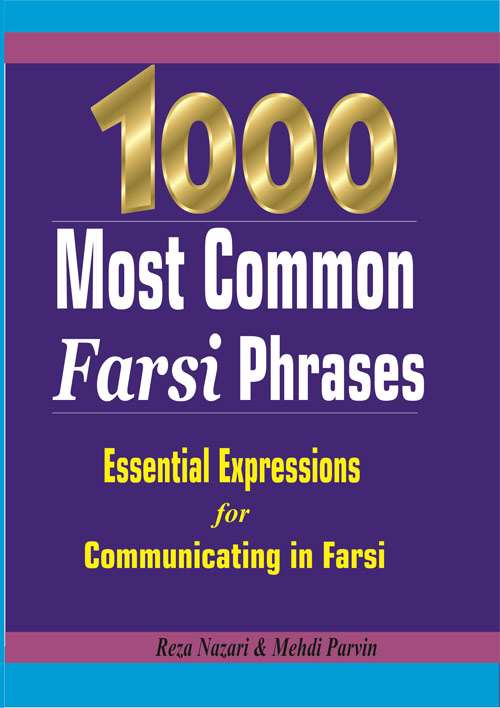
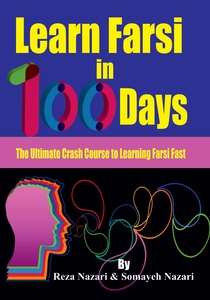






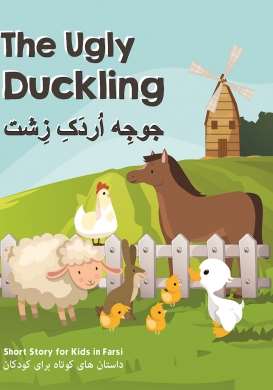
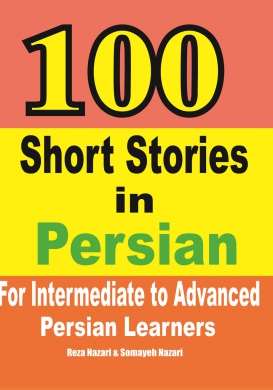

What people say about "Returning once more to the Story"?
No one replied yet.